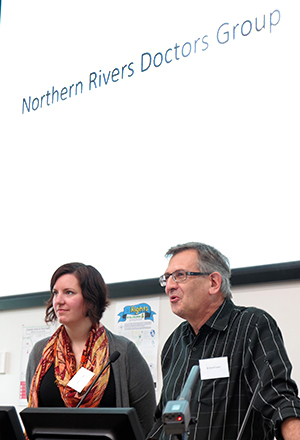As a lay attendee (one of only two) at the NoRDocs Unconference I am in no position to comment on the clinical veracity of the presentations delivered in the packed six hours that it ran.
As the presenters were acknowledged experts in their diverse fields, I can only assume that they spoke with authority and made significant contributions to the knowledge base of the audience, including us two ‘NCAs’ who, perhaps surprisingly, found most of the sessions understandable.
Certainly, the reception that all speakers received was extremely positive.
The frustration, of course, was how to resolve the dilemma facing all ‘festival’ goers - would one prefer ‘Tom Keneally in conversation’ or ‘Gareth Evans with Kerry O’Brien’? (examples from this year’s Byron Writer’s festival) . Or in the Unconference, GP Dr Zewlan Moor from Byron Bibliotherapy on the healing power of reading, or neurologist Dr Bob Lodge on the timely topic of cannabis in medicine, and how Australia has been slow to address the relevant issues?
Clearly, one can’t be in two sessions at once, although unlike, say, the writer’s festival, we do have free access to all Unconference sessions through videos to be posted on the GPSpeak website. Well done, organisers.
That said, certain things stood out in the presentations I could attend, and some controversy attaches to them.
The demise of the nationally acclaimed North Coast GP Training two years ago was “a real tragedy”, in the words of Nick de Marco, standing in for Dr Chris Jambor who had recently experienced a significant accident.
This project remains on the back burner, ready to be re-ignited should the federal government not be fully satisfied by the centralised provider chosen to take over this vital training role. The new arrangements have been widely criticised, and if there are to be changes, North Coast GP Training is well prepared to step into the breach.
“Doctors in trouble are falling through the cracks,” said Dr Jane Barker speaking of the need to better help both medical students and practising doctors who face personal stressors ranging from exam anxiety through to frequent patient mortality… “We see a lot of suffering, we need formal systems to support us.”
Striking a parallel with going into a procedure with a rusty scalpel, Dr Barker added, “If we’re not well, we’re in trouble.”
Beginning his talk on shared medical appointments (SMA) with a cartoon showing a gut-bulging patient saying, “It’s me knees, doc”, Dr Andrew Binns said that when he started as a local GP in 1979 around 20 per cent of his patients suffered chronic disease. Now he estimates it is around 80 percent.
The impediment to the wider use of SMAs, already popular in the UK and North America, was, in a word, “Canberra” he said.
“We have made a number of representations to politicians and the department [Health], and received reassuring words, but no sign that SMAs will be supported through the MBS.”
Amongst the various sessions addressing how the Australian healthcare system might do things better, with the USA’s much criticized system being a frequent reference point, one stood out - for me, as an NCA - on the basis that it ticked a number of boxes in addition to the medical.
Dr Arthur Proudfoot is a local GP of Canadian extraction whose work has a significant focus on Aboriginal communities. Like one of the Unconference coordinators, Dr David Guest, who spoke on cyber security, he is somewhat of an “IT geek”, and with a colleague has developed an e-health professionals directory known as GPReferral.com
The aim of the project, launched at the Unconference after an intense development period, is to provide an updated database of health professionals, public and private - surgeons, allied health, diagnostic services etc - to whom GPs can refer their patients.
This service, which will be supported by subscriptions from non-GP providers, is both a fine example of the innovation that the federal government extols, and a local initiative. The most surprising thing is that no one has done it before.
The same could be said for the NoRDocs Unconference - the Northern Rivers has an increasingly strong reputation for the quality of its medical services and the dedication of its practitioners. Bringing them together for collegial and educational exchanges is long overdue. It is highly likely to be the first, not the last, gathering of this kind.
The day ended with two ’lightning talks’, a conference version of speed-dating where presenters were allowed four minutes to put their case. The first was Boyoung Kim, a recent medical graduate supported by the University for Rural Health, whose Lismore headquarters hosted the Unconference. Being able to discuss patients’ issues with senior clinicians was a marked difference from the more formal protocols observed in the big cities, Dr Kim said.
The second was Sharyn White, then acting Director of the North Coast Primary Health Network, my co-NCA, who, in addressing her given theme of The Yellow Brick Road, explained the complex workings of the region’s primary care co-ordination tool, HealthPathways. It was a whimsical yet meaningful ending to a Saturday well spent.
















